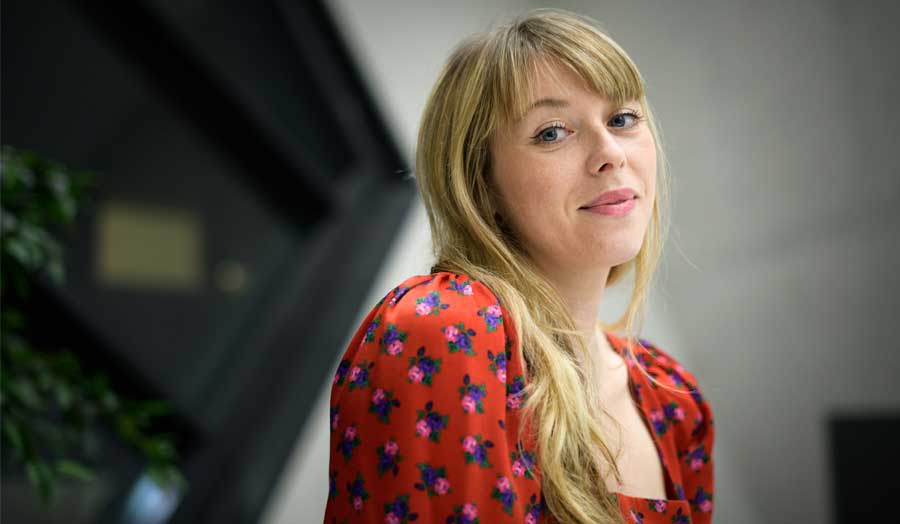The Creative, Digital and Professional Writing MA graduate talks about her unconventional path to postgraduate studies, the importance of criticism and why keeping an open mind in your studies can pay off in your professional career.
Can you tell us a bit about your background generally and what led you to London Met?
I didn’t do an undergrad (I was accepted to study marine biology at another university but had an epiphany while in a supermarket car park and decided it was not for me), so I’ve done a lot in my life in search of what I want to do. I’ve worked as a producer, presenter, director, but the one thing I’ve always done is written. It just never occurred to me you could make a career out of it when I was younger.
Since dedicating myself to writing, I have also had the pleasure of working as a cleaner, a waitress and a secretary to support myself. In the last few years I’ve managed to just about support myself from writing, and as I had made it my career I wanted a formal qualification in it. I wanted to dedicate myself to it officially.
While looking for master’s degrees I found London Met’s Creative, Digital and Professional Writing MA did everything I was interested in, and more. And when I spoke to Anne Karpf I knew I had found the right place for me. London Met was also willing to take me on based on my writing experience and career to date, rather than just saying, "No, you don’t have BA, therefore you can’t do this." I thought that was quite radical.
What did you make of the facilities and lecturers?
The facilities that I used were excellent – I regret not using the library and the database more. The lecturers were all great in their idiosyncratic ways, and at least two will remain my all-time favourite and most inspiring teachers. They were encouraging but also offered vital criticism, and I was there for both. The encouragement was important fuel, but it will be the criticism that ends up being most valuable to my career. I think it’s important students remember that: the teachers aren’t there to flatter you, they’re there to make you a better writer.
Did anything surprise you?
Aside from the amount of work (I had underestimated this), the Curatorial Writing module – it was fascinating. I’ve always been a cynic in regards to conceptual art, but Nico de Oliveira completely opened my mind to it. Creative non-fiction was also a wonderful surprise in how liberating it is to write about real life (something I’d always avoided). Every course has pleasant surprises provided you are willing to go in with an open mind and explore new areas. London Met and the School of Art, Architecture and Design also put on fascinating talks – go to them!
What was the highlight of your course?
I was lucky to have a few. I had a piece published in the Creative Writing Anthology; a piece I came up with in Feature Journalism was published in the New Statesman; and I gave a presentation in Curatorial Writing. I’m a writer for a reason – I can be a stuttery, self-conscious speaker. So giving a half hour memorised presentation and enjoying it was a revelation!
What do you like about life in London?
The galleries. We're lucky that so many of London’s galleries have a free collection for you to wander in and look at. It has beautiful parks. Excellent pubs. Old streets. Incredible churches, cathedrals and abbeys. It also has great bars and clubs (apparently). And the theatres, concert halls, and cinemas – most offer student discounts.
What's next for you in your career?
I’ve just finished my first novel. Now I’m in the beginning stages of seeking representation. My time at London Met confirmed what I had suspected of being a writer today – that you can have a speciality but it's important you are able to write in other areas, and that's no bad thing.
I’ve got several writing jobs on the go. I’m writing newsletters for a brand I love (something we covered in Digital Storytelling), and I have a new job writing art news, something I used to do and Curatorial Writing made me realise I missed.
In the future I just hope to keep writing. I started my second novel in Creative Writing and that was my dissertation. And I might try presenting again – but art or writing-related this time around rather than fashion. And I miss writing poetry, so more of that. More! More! More! (And also, a break from it all…)
Do you have any tips for those looking to make a career out of writing?
Keep going. Everybody says it – well, not everybody, a lot of people will tell you to give up, and you may come to the conclusion that is what is best for you. But if you really want to be a writer, you have to just keep going. You'll have highs and you'll have lows, lows that will make you feel like you never had a high. But time and dedication are a judge of your craft, not money.
Don’t get me wrong, it’s important to be paid appropriately for your work, and you will probably have to demand that from time to time, but in the end, being a writer is about writing because your life is not complete without it.

